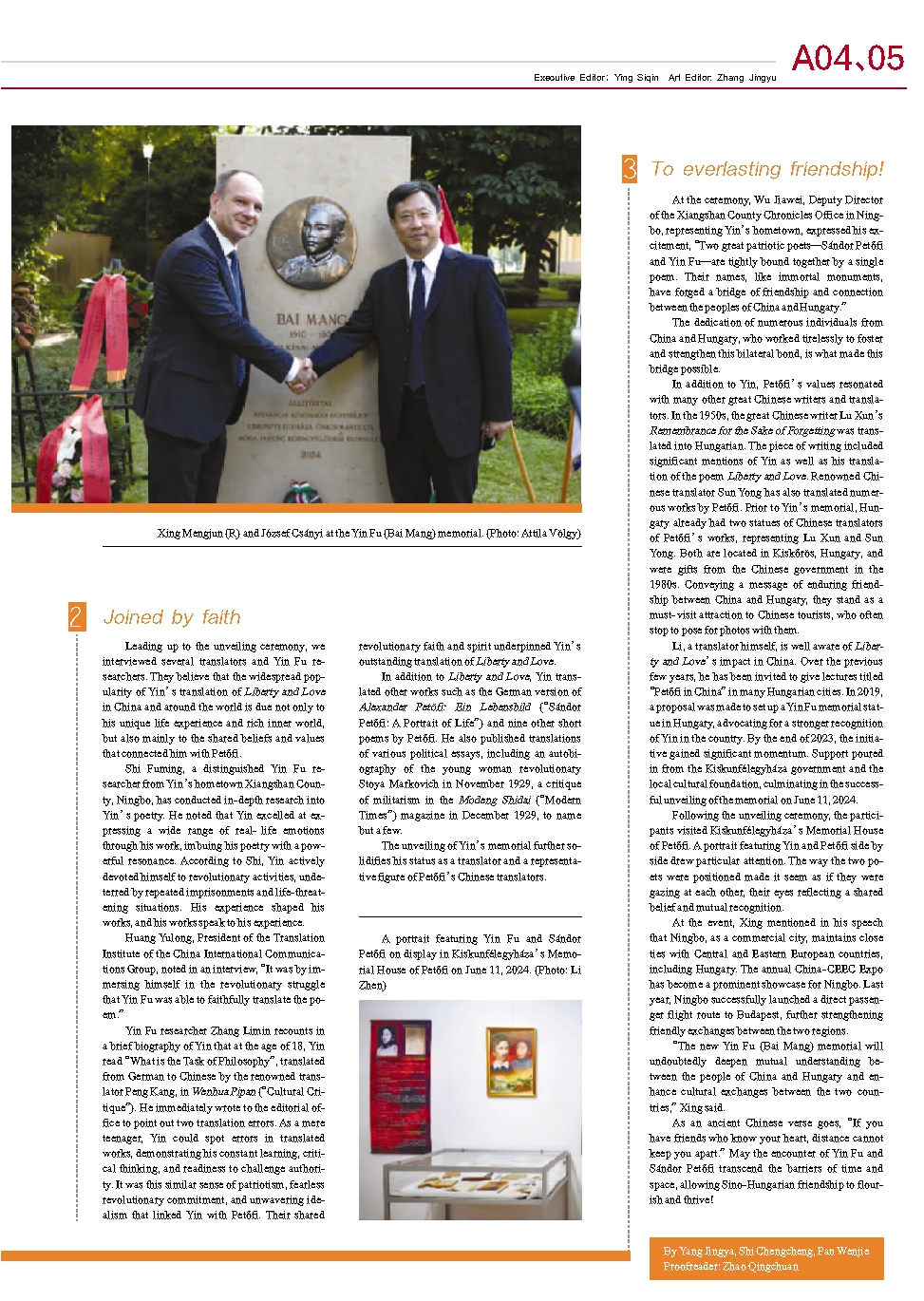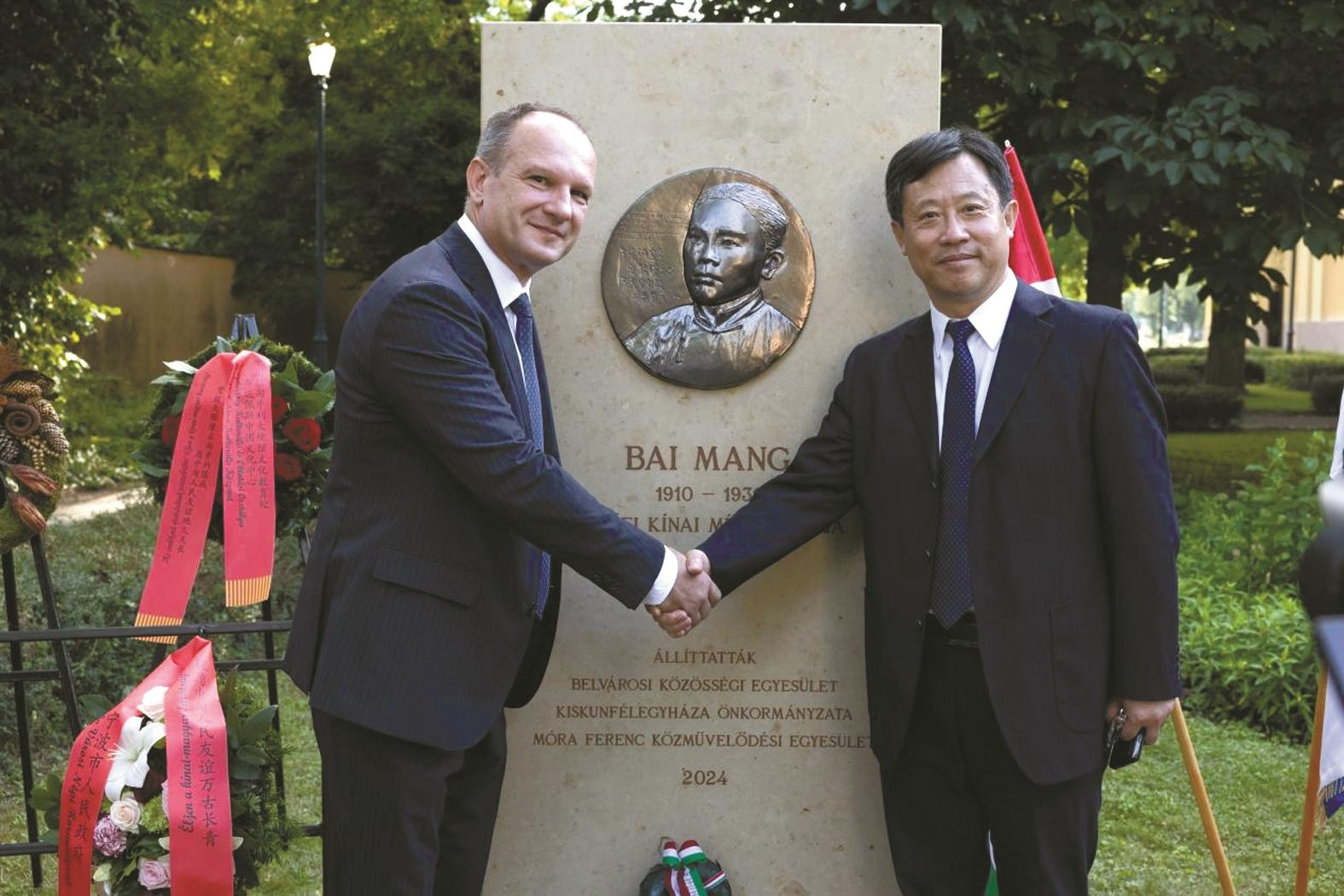Joined by faith
Leading up to the unveiling ceremony, we interviewed several translators and Yin Fu researchers. They believe that the widespread popularity of Yin’s translation of Liberty and Love in China and around the world is due not only to his unique life experience and rich inner world, but also mainly to the shared beliefs and values that connected him with Petőfi.
Shi Fuming, a distinguished Yin Fu researcher from Yin’s hometown Xiangshan County, Ningbo, has conducted in-depth research into Yin’s poetry. He noted that Yin excelled at expressing a wide range of real-life emotions through his work, imbuing his poetry with a powerful resonance. According to Shi, Yin actively devoted himself to revolutionary activities, undeterred by repeated imprisonments and life-threatening situations. His experience shaped his works, and his works speak to his experience.
Huang Yulong, President of the Translation Institute of the China International Communications Group, noted in an interview, “It was by immersing himself in the revolutionary struggle that Yin Fu was able to faithfully translate the poem.”
Yin Fu researcher Zhang Limin recounts in a brief biography of Yin that at the age of 18, Yin read “What is the Task of Philosophy”, translated from German to Chinese by the renowned translator Peng Kang, in Wenhua Pipan (“Cultural Critique”). He immediately wrote to the editorial office to point out two translation errors. As a mere teenager, Yin could spot errors in translated works, demonstrating his constant learning, critical thinking, and readiness to challenge authority. It was this similar sense of patriotism, fearless revolutionary commitment, and unwavering idealism that linked Yin with Petőfi. Their shared revolutionary faith and spirit underpinned Yin’s outstanding translation of Liberty and Love.
In addition to Liberty and Love, Yin translated other works such as the German version of Alexander Petöfi: Ein Lebensbild (“Sándor Petőfi: A Portrait of Life”) and nine other short poems by Petőfi. He also published translations of various political essays, including an autobiography of the young woman revolutionary Stoya Markovich in November 1929, a critique of militarism in the Modeng Shidai (“Modern Times”) magazine in December 1929, to name but a few.
The unveiling of Yin’s memorial further solidifies his status as a translator and a representative figure of Petőfi’s Chinese translators.
To everlasting friendship!
At the ceremony, Wu Jiawei, Deputy Director of the Xiangshan County Chronicles Office in Ningbo, representing Yin’s hometown, expressed his excitement, “Two great patriotic poets—Sándor Petőfi and Yin Fu—are tightly bound together by a single poem. Their names, like immortal monuments, have forged a bridge of friendship and connection between the peoples of China and Hungary.”
The dedication of numerous individuals from China and Hungary, who worked tirelessly to foster and strengthen this bilateral bond, is what made this bridge possible.
In addition to Yin, Petőfi’s values resonated with many other great Chinese writers and translators. In the 1950s, the great Chinese writer Lu Xun’s Remembrance for the Sake of Forgetting was translated into Hungarian. The piece of writing included significant mentions of Yin as well as his translation of the poem Liberty and Love. Renowned Chinese translator Sun Yong has also translated numerous works by Petőfi. Prior to Yin’s memorial, Hungary already had two statues of Chinese translators of Petőfi’s works, representing Lu Xun and Sun Yong. Both are located in Kiskőrös, Hungary, and were gifts from the Chinese government in the 1980s. Conveying a message of enduring friendship between China and Hungary, they stand as a must-visit attraction to Chinese tourists, who often stop to pose for photos with them.
Li, a translator himself, is well aware of Liberty and Love’s impact in China. Over the previous few years, he has been invited to give lectures titled “Petőfi in China” in many Hungarian cities. In 2019,a proposal was made to set up a Yin Fu memorial statue in Hungary, advocating for a stronger recognition of Yin in the country. By the end of 2023, the initiative gained significant momentum. Support poured in from the Kiskunfélegyháza government and the local cultural foundation, culminating in the successful unveiling of the memorial on June 11, 2024.
Following the unveiling ceremony, the participants visited Kiskunfélegyháza’s Memorial House of Petőfi. A portrait featuring Yin and Petőfi side by side drew particular attention. The way the two poets were positioned made it seem as if they were gazing at each other, their eyes reflecting a shared belief and mutual recognition.
At the event, Xing mentioned in his speech that Ningbo, as a commercial city, maintains close ties with Central and Eastern European countries, including Hungary. The annual China-CEEC Expo has become a prominent showcase for Ningbo. Last year, Ningbo successfully launched a direct passenger flight route to Budapest, further strengthening friendly exchanges between the two regions.
“The new Yin Fu (Bai Mang) memorial will undoubtedly deepen mutual understanding between the people of China and Hungary and enhance cultural exchanges between the two countries,” Xing said.
As an ancient Chinese verse goes, “If you have friends who know your heart, distance cannot keep you apart.” May the encounter of Yin Fu and Sándor Petőfi transcend the barriers of time and space, allowing Sino-Hungarian friendship to flourish and thrive!
By Yang Jingya, Shi Chengcheng, Pan Wenjie
Proofreader: Zhao Qingchuan



